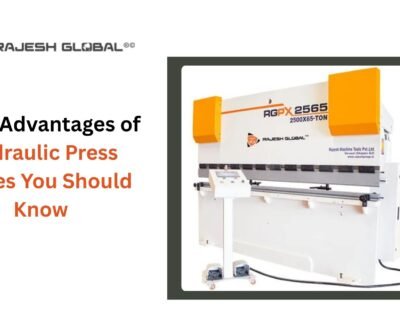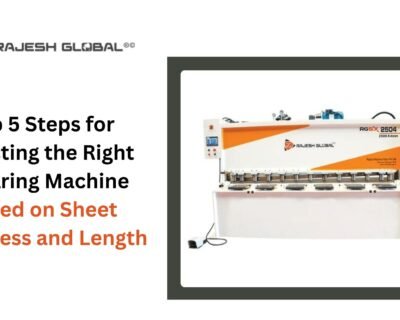Blog

Rajesh Machines: The Future of Shearing Machines in Modern Manufacturing
The global sheet metal market stands at a staggering $452 billion in 2025, projected to surge past $755 billion by 2037. Behind this explosive growth lies a fundamental truth that savvy entrepreneurs understand: manufacturing excellence isn’t just about what you make—it’s about the precision of how you cut, shape, and form. At the intersection of traditional craftsmanship and cutting-edge technology stands Rajesh Machine Tools, a company that has spent 38 years transforming how the world thinks about shearing machines.
Introduction: Manufacturing is Evolving—So Are the Machines That Shape It
Contents
- 1 Introduction: Manufacturing is Evolving—So Are the Machines That Shape It
- 2 Shearing in Modern Industry: Still Essential, Now Smarter
- 3 The Engineering Philosophy Behind Rajesh Machine Tools
- 4 Precision Meets Power: The Next Generation of Shearing Machines
- 5 Digital Intelligence: How Rajesh Machines Integrates Automation and CNC Controls?
- 6 Built for India, Ready for the World: Performance Under Pressure
- 7 Sustainability in Shearing: Efficiency, Energy-Saving, and Waste Reduction
- 8 Human-Centric Design: Operator Safety, Simplicity, and Reliability
- 9 Competitive Edge: What Sets Rajesh Shearing Machines Apart
- 10 Conclusion: When the Cut is Critical, Trust the Name That Cuts Ahead
The manufacturing landscape has undergone a seismic shift since the early days when “people used hand tools such as scissors, knives, and scissors to cut sheet metal”. Today’s reality is far more sophisticated, demanding precision that would have been unimaginable to 18th-century craftsmen. What makes this evolution particularly fascinating is how companies like Rajesh Machine Tools have bridged this gap, evolving from the mechanical lever-driven systems of the 1800s to today’s computer-controlled marvels that can “predict and adjust for material variations, enhancing overall efficiency”.
The journey from manual cutting to modern CNC-controlled shearing represents more than technological advancement—it reflects a fundamental shift in manufacturing philosophy. Where once efficiency meant faster hands, today it means smarter machines. The integration of “AI and Machine Learning” in shearing processes doesn’t just optimize cuts; it transforms entire production workflows. For startup entrepreneurs entering manufacturing, understanding this technological trajectory isn’t just helpful—it’s essential for competitive survival.
Shearing in Modern Industry: Still Essential, Now Smarter
Despite the rise of 3D printing and additive manufacturing, shearing remains the backbone of modern fabrication. The numbers tell a compelling story: the manufacturing industry in the United States alone generated approximately $6 trillion in 2022, with sheet metal forming a critical component across automotive, aerospace, and construction sectors. What’s remarkable is how this ancient cutting principle has adapted to meet contemporary demands.
Modern shearing technology has evolved far beyond simple blade-on-blade cutting. “Computer Numerical Control (CNC) technology revolutionizes metal shearing, offering higher precision, automation, and flexibility in complex cutting patterns”. This isn’t merely an upgrade—it’s a complete reimagining of what shearing can accomplish. Where traditional methods struggled with repeatability and precision, CNC systems deliver cuts with tolerances measured in fractions of millimeters, enabling manufacturers to meet increasingly stringent quality standards while maintaining production speed.
The Engineering Philosophy Behind Rajesh Machine Tools
Core Values That Drive Innovation
Since 1984, Rajesh Machine Tools has operated under a philosophy that excellence emerges from the intersection of experience and innovation. Their approach to shearing machine development reflects five fundamental principles:
- Teamwork – Collaborative engineering that combines diverse expertise
- Excellence – Pursuit of industry-leading performance standards
- Commitment – Long-term partnerships with manufacturing clients
- Integrity – Transparent engineering and honest capability assessment
- Customer Satisfaction – Solutions designed around real-world manufacturing challenges
Vision-Driven Development
What sets successful manufacturing companies apart isn’t just their current capabilities—it’s their vision for the future. Rajesh Machine Tools has articulated an ambitious goal: “By 2031 RAJESH will be the No. 1 company in the sheet metal manufacturing industry”. This isn’t corporate bluster; it’s a roadmap backed by substantial investment in research and development, infrastructure expansion, and talent acquisition.
Precision Meets Power: The Next Generation of Shearing Machines
The RG-Cut CNC Hydraulic Shearing Machine represents everything modern manufacturing demands: precision, power, and programmability. These machines “utilize two blades – an upper movable blade and a lower fixed blade – to shear metal plates of different thicknesses”, but the elegance lies in the execution details.
Consider the technical specifications that matter to serious manufacturers: cutting lengths ranging from 2000mm to 6000mm, optimum variable rake angle hydraulic systems, and heavy-duty rigid all-welded steel frames. These aren’t just features—they’re solutions to specific manufacturing challenges. The variable rake angle, for instance, optimizes cutting force distribution across different material thicknesses, reducing blade wear while improving cut quality.
Digital Intelligence: How Rajesh Machines Integrates Automation and CNC Controls?
The integration of digital intelligence into shearing operations represents a paradigm shift from reactive to predictive manufacturing. Rajesh’s CNC systems feature “automatic programmable high-speed ball screw back gauge with AC servo motor”, enabling unprecedented repeatability and positioning accuracy. This level of automation doesn’t just improve efficiency—it fundamentally changes how manufacturers approach production planning.
The 7-inch color touch screen interface transforms operator interaction with complex machinery. Rather than requiring specialized training for every function, operators can intuitively navigate cutting programs, adjust parameters in real-time, and monitor performance metrics. This democratization of advanced manufacturing capability means smaller manufacturers can access enterprise-level precision without enterprise-level complexity.
Built for India, Ready for the World: Performance Under Pressure
Operating from Rajkot, “the machine tools hub of India,” Rajesh Machine Tools has developed machines that excel under the demanding conditions of global manufacturing. The company’s infrastructure spans 60,000 square feet across three plants, equipped with both indigenous and imported machinery that reflects their commitment to world-class manufacturing standards.
What makes this particularly relevant for emerging manufacturers is the proven track record under diverse operating conditions. Indian manufacturing environments often present unique challenges—from power quality variations to extreme ambient temperatures—that test equipment durability. Machines that perform reliably in these conditions typically exceed expectations in more controlled environments.
Sustainability in Shearing: Efficiency, Energy-Saving, and Waste Reduction
Modern manufacturing faces increasing pressure to minimize environmental impact while maximizing productivity. Rajesh Machine Tools addresses this challenge through “resource utilization and waste reduction” strategies that “utilize resources like metal, electric power and tools in the most efficient manner”. This isn’t just environmental responsibility—it’s economic necessity.
The hydraulic systems in Rajesh shearing machines, sourced from premium suppliers like “Yuken India / Bosch Rexroth”, deliver precise force control that minimizes energy consumption while maximizing cutting performance. Precise blade positioning reduces material waste, while programmable cutting patterns optimize sheet utilization. For cost-conscious manufacturers, these efficiency gains translate directly to improved bottom-line performance.
Human-Centric Design: Operator Safety, Simplicity, and Reliability
The most sophisticated machine is worthless if operators can’t use it safely and effectively. Rajesh’s commitment to human-centric design appears in features like “front safety guard,” “front safety with laser light,” and “automatic sheet thickness” detection. These aren’t afterthoughts—they’re integral design elements that recognize the human element in manufacturing excellence.
The movable front gauge with linear guide exemplifies this philosophy. Rather than requiring operators to manually position materials with limited visibility, the system provides precise, repeatable positioning with clear visual feedback. This reduces both operator fatigue and the likelihood of positioning errors that compromise cut quality.
Competitive Edge: What Sets Rajesh Shearing Machines Apart
In a competitive marketplace where numerous manufacturers offer shearing solutions, differentiation emerges from the details that matter most to actual users. Rajesh’s competitive advantages include specialized cutting blades “made for mild steel and stainless steel”, recognizing that different materials require optimized cutting geometries for best results.
The integration of premium components—Schneider/Siemens electrical systems, Bosch Rexroth hydraulics—demonstrates a commitment to reliability that reduces total cost of ownership. For manufacturers evaluating shearing machine investments, the initial purchase price represents only a fraction of lifetime costs. Reliability, service availability, and performance consistency determine true value.
Conclusion: When the Cut is Critical, Trust the Name That Cuts Ahead
The future of manufacturing belongs to companies that understand precision isn’t just about tolerances—it’s about the intersection of technology, reliability, and human expertise. As the sheet metal market continues its projected growth toward $755 billion by 2037, the companies that succeed will be those equipped with machinery that doesn’t just meet today’s requirements but anticipates tomorrow’s challenges.
Rajesh Machine Tools represents more than four decades of engineering evolution, from the company’s founding in 1984 to its current position as an emerging global leader in sheet metal machinery. For entrepreneurs entering manufacturing, the choice of shearing equipment isn’t just about immediate capabilities—it’s about partnering with a company whose vision extends to 2031 and beyond, backed by the engineering expertise to make that vision reality.
When precision matters, when deadlines are non-negotiable, and when your reputation depends on the quality of every cut, the choice becomes clear. In manufacturing, as in life, you’re only as good as your tools—and some tools are simply better than others.







